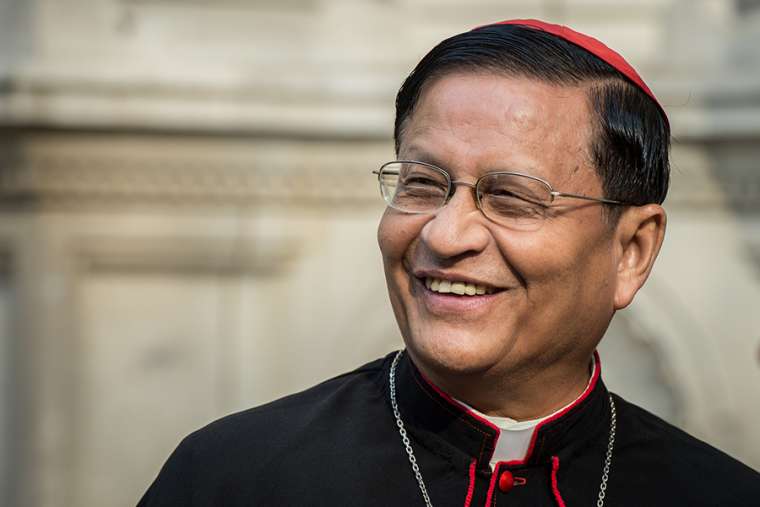ROME – The Vatican’s long-rumored China deal was discussed by Myanmar’s bishops this week during an ad limina visit with Pope Francis, according to the Archbishop of Yangon.
Cardinal Charles Maung Bo told CNA that during a 90 minute conversation, the bishops talked with Francis about work for reconciliation in the country, the role of the Church in that process, the Rohingya crisis, and the conflict in the state of Rakhine.
“Things have changed in the country, we have more freedom, but our country is fragile,” noted Bo.
Francis met the bishops of Myanmar May 8, and part of the conversation also included the pope’s 2017 visit to Myanmar, also called Burma, and the outcomes of that visit.
Bo said that the Nov 28-30 papal trip generated a positive rebound in the Church’s life.
“We told the pope,” Bo said, “that his visit had a great impact. In particular, the fact that he had met with the General Min Aung Hlaing helped the Church to be more recognized, and now the bishops can more easily have meetings with top ranking officials.”
Bo added that “people were touched by the pope’s visit, and people started thinking more.”
Francis, Bo said, “insisted on the need to care for and be close to priests, and put emphasis on the importance of catechesis and mission.”
The Myanmar bishops also asked the pope about the “China issue, as we read so much information about the possibility of a deal.”
Bo said that the issue of a China deal had been also discussed in a meeting between Myanmar’s bishops and the Holy See’s Secretary of State, Cardinal Pietro Parolin.
Parolin, he said, said that “relations with China have been started,” but that at the moment “they are considering suggestions and input,” and for this reason “things are not going on so much,” especially because of Taiwanese concerns about a possible China–Holy See deal.
Bo said that “the pope has said that the Church is close to China in three ways: through the Secretariat of State, through friendship, and through cultural dialogue.”
Beyond the diplomatic contacts, friendship is very important to the pope, Bo said, and the pontiff talked about “very important people from China who come to the Vatican, and develop a friendship that is crucial in relations.”
The cultural channel has been pursued with initiatives like that of a recent Vatican Museums’ exhibition in China.
Myanmar’s bishops are very interested in Holy See–China relations because these could also affect the life of their Church. In particular, Bo mentioned that there are four dioceses in Myanmar that border China, and he also stressed that the conflict in Myanmar’s Kachin state might be affected by such a deal.
Kachin is a majority Christian state, composed of six ethnic groups whose homeland is in the Kachin Hills, at the frontier between Myanmar, China and India.
The conflict has embroiled the region for years, and has recently escalated in new clashes, among the most intense since the 1960s.
Bo noted that the conflict has displaced about 100,000 people.
“The bishops of Myanmar asked the pope to pray [publicly] for the people who are suffering the conflict,” Bo said.
Another topic of discussion was the Rohingya ethnic group, though Bo prefers to describe them as “Muslims of the Rakhine state” in order not to back any nationalist claim from them.
Bo said that Myanmar’s bishops told the pope that the Rohingya are “two million Stateless people who move between India, Myanmar, Bangladesh, Indonesia, Thailand,” and suggested to “organize an international conference to tackle the crisis.”
In the end, Bo stressed that the Church in Myanmar “can promote reconciliation and peace. The best message we can deliver is that we have faith and the ability to build the nation with hope, peace and reconciliation.”












